CPO News May 2023
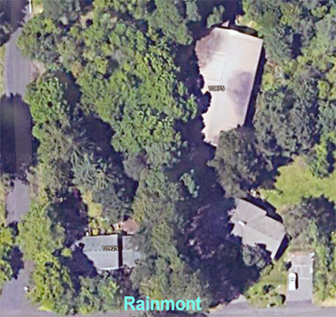
- May meeting
- Future of the CPO system
- Neighborhood Meetings
- Development applications
- April meeting notes
May meeting
Tuesday, May 9, 7-9 pm, hybrid via zoom and at Cedar Grove East Community Room, 13400 NW Cornell
The April “hybrid” meeting was a success! See below for a recap. So now you have the choice of meeting via zoom, or in person at the East Community Room at Cedar Grove Apartments at the corner of Murray and Cornell. If you are driving, please either park on the street or in the southeast corner of the Safeway lot.
After the Land Acknowledgement and updates from our service providers, we’ll share any development information we have received and provide time for announcements.
Volunteering at BSD schools, and a BSD update
Christina Mackin, Community Resource Coordinator for Beaverton School District, will visit to tell us about volunteer opportunities with BSD. She’ll be joined by Shellie Bailey-Shah, Public Communications Officer, who will summarize other district news and answer any questions.
Westside Multimodal Improvements Study
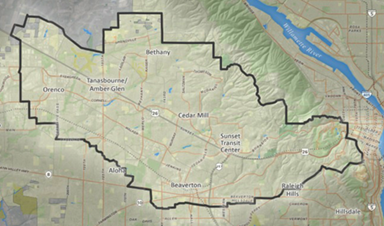
Stephanie L. Millar, ODOT Principal Planner, Urban Mobility Office and her team are studying how people travel in and through the westside corridor today and in the next 20 years. Building off of past studies, ODOT and Metro, in partnership with local agencies and other stakeholders are learning about the current problems people have traveling by bus, on foot, or with wheels, also known as multimodal options. We’ll analyze these challenges and work with the community to create solutions to solve those problems. Learn more on the project website.
Click the zoom link to join the meeting live or watch it later on our YouTube Channel. We have been live-streaming our meetings since before COVID. Like or follow our Facebook page for timely announcements of interest to all our neighbors in CPO 1 (Cedar Mill, Cedar Hills, Bonny Slope). We think our content is too good to only share it with those who can attend on a weeknight!
Future of the CPO system
Oregon’s Land Use Laws currently require a way for citizens to participate meaningfully in land use decisions. That’s why Washington County established CPOs in the mid-1980s. Originally administered by OSU Extension Service, independent of County government, CPOs were brought under county administration in 2016. At first, we worked directly with the County Administration Office (CAO). Then the county established the Community Engagement department. Eventually this became the Office of Equity, Inclusion, and Community Engagement (OEICE). The level of support for CPO leaders has dropped with every new “owner.” For program volunteers, it feels like being an unwanted stepchild: first we had our own bedroom, then we had space on the porch, and now we’re in a tent in the backyard.
The next step in this evolution is unfolding, with a “Re-envisioning” of the program that will be presented at the 9 am, May 9 Work Session of the Board of County Commissioners (BCC). These meetings may be observed by the public but comments are not accepted. We’ll know more about the plan’s future after the BCC discusses it and asks questions.
Two major changes are proposed: redrawing CPO boundaries, and which county department will manage the CPO system. A PDF file of the proposal is available here. The specific proposals begin on page 27.
The following are options proposed by OEICE for CPO/CCI coordination: Option 1: Shift the coordination of the CCI to Land Use and Transportation clarifying what entity they advise (planning staff, the Planning Commission, or the BCC). Option 2: Shift the CCI to be a sub-committee of the Planning Commission. Option 3: Shift the CCI to be a formalized BCC-appointed advisory committee independent of the Planning Commission focused beyond Goal 1 elements.
Fox guarding henhouse? If you care about having an independent organization representing your interest in Washington County land use, plan to watch the May 9 meeting or watch the recording that will be posted later. We’ll follow up next month when we’ll have a better idea of how the plan was received and any future meetings scheduled.
Neighborhood Meetings
CPO 1 represents neighbors in Cedar Mill, Cedar Hills, and Bonny Slope. We track land use issues including development applications and help our community understand what’s involved, how they can respond, and how county agencies work.
Seven townhouses on Dale?
Tuesday, May 9, 7 pm, via zoom (email Mark Dane for link)
Mark Dane Planning is holding a meeting with interested neighbors to discuss developing a seven-lot subdivision for semi-detached townhomes on a 0.62 acre parcel at 560 NW Dale (at Sherry). The homes would access Dale from a single private street along the property’s northern edge.
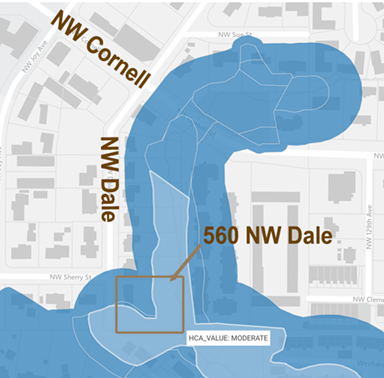
The southern and eastern portions of the parcel have a Significant Natural Resource. Following their vote on April 21, 2023, Oregon’s Land Conservation and Development Commission (LCDC) will issue a stay preventing Washington County from approving new residential development in designated wildlife areas until they produce “clear and objective” standards. We will write more about this in June, since things are still in flux. The county webpage on Significant Natural Resources is here. See Development News for the county’s announcement.
The developer’s representative, Mark Dane, says, “The proposed development is not on the wildlife habitat. It is adjacent. We are protecting the habitat, as well as a 50-ft buffer. Of course everything is now up for interpretation.”
The last time development was proposed for this site, in 2018, neighbors filed an appeal but in the end, it was approved but never developed. Mark Dane was the developer’s representative in that proposal also. At the time, they disputed the Metro map used to delineate natural resources, claiming that the area is too badly degraded.
Malia Lane proposed two-parcel partition
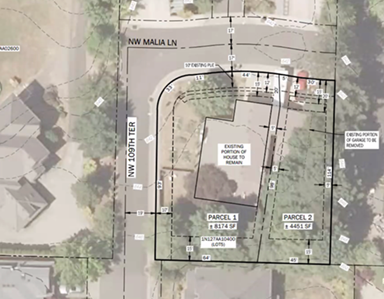
A meeting was held on Thursday, April 27 to discuss a partition of a lot at the corner of Malia Lane and NW 109th Terrace. The existing home would be retained and a new lot for a single family residence would be created. If the partition is approved, a development application for the house would come later. Matt Newman, NW Engineers, represented Jo Gold, the property owner, who did not attend the meeting.
Neighbors were concerned about traffic, construction noise, and tree removal. They said that dozens of trees have already been cut, which is perfectly legal in the county, which has no tree protection code. The county sometimes requires some trees be retained as part of the development process, but a landowner can do anything they want on their property if a current development is not in process.
During the pre-application meeting, the county indicated that it would require a sidewalk on the south side of Malia, and possibly a planting strip. Newman said that was a problem because of the size of the lot.

Development applications
Rainmont partition
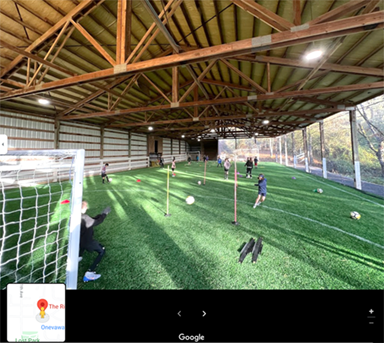
A three-parcel partition was requested for 2.62 acres north of Rainmont. The application was approved on April 5, but shortly after that, a complaint was received by the county because the landowner was operating an unlicensed commercial soccer training facility behind his house. Heather Sturgill, Senior Communication Specialist, said, “The Development Review team is aware of the situation on this property and will be meeting with the owner soon to discuss next steps. We have initiated a compliance violation from our code enforcement team for building and use issues regarding use of the structure in question as a public soccer practice facility. The owner has agreed to put his partition application on hold until this issue is resolved.”
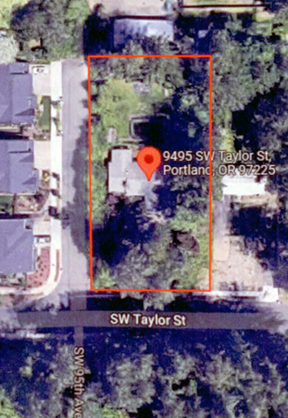
SW Taylor and SW 95th partition
A review is underway for a proposal to create three lots from a 0.51-acre parcel zoned R-5 (five lots to the acre). The existing house and all structures would be removed. If the partition is approved, separate application(s) would be submitted for construction.
April meeting notes
Bruce Bartlett, Vice Chair
On April 11, 2023, CPO 1 had its inaugural hybrid monthly meeting (link to Youtube recording) both virtual via zoom and in-person. Prior to the pandemic, our parent organization at Washington County, the Office of Equity, Inclusion, and Community Engagement (OEICE) had created “goKits” with equipment needed to manage hybrid meetings, but we hadn’t had the motivation to use ours until now, when people feel more comfortable meeting in person. Our recent survey showed considerable interest in the in-person option, so we were able to partner with management at Cedar Grove, our affordable housing apartment that is administered by Community Partners for Affordable Housing (CPAH) to use one of their Community Rooms.
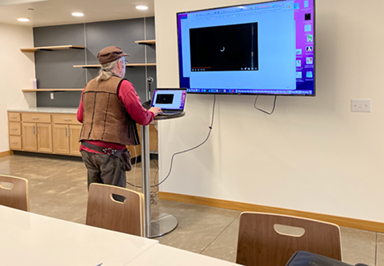
A week before the meeting Chair Virginia Bruce and I tested a laptop with the kit’s new camera and microphone, connecting to the room’s large flat screen. Everything just worked, getting us off to an auspicious start to a new meeting style era. We didn’t want to announce this option before we knew it would work so the meeting was something of a ‘soft open.’
After the service provider updates, our featured subjects were the county’s behavioral health services and the homeless/shelter services. Nick Ocon, Behavioral Health Division Director, and Emily Roots, Public Affairs and Communications Coordinator, and Katherine Galian, Continuum of Care Program Manager, were the county staff attending. All gave outstanding presentations, and we are grateful they were able to join us to explain the crucial services their departments provide.
There was fortunate synergy between the meeting topics and the hybrid meeting location. Cedar Grove is a four-story building with 44 apartments—eight units are set aside for formerly homeless families. It is built on a lot that Washington County had purchased and cleared during an upgrade of the intersection at NW Murray Road and NW Cornell Road. CPAH is a major non-profit provider of housing services. Eventually, CPAH and Wash Co LUT negotiated a deal and Cedar Grove came to be Beaverton’s first regulated and affordable apartment complex designated for the purpose of housing low-income and homeless families. The developers chose to have the property annexed into the City of Beaverton to take advantage of the city’s development services.
Several Cedar Grove residents came to the CPO 1 meeting, thinking it was a meeting specifically for them. We welcomed them and told them the agenda. A man who lived in the complex came early and, learning that housing services were on the agenda, explained his situation to me. As a formerly homeless person, he was relieved to be living there but told of how his sister is providing shelter in her house for four people, including a 72-year-old woman friend confined to a wheelchair. He was desperate to find a place for his friend and was hopeful that I could help him.
This placed me in a situation I have been in before; as a volunteer in county advisory committees and citizen groups, I have been challenged to help someone find an entry point into our public health support system. It is one thing to talk about county services, it is an altogether different situation to have to actually use them, responding to a person in need looking me right in my eyes. “Who do I tell them to call/email?” “Where do they go?”
Fortunately, this time it promises to be different. The resident gave me his contact information but left the meeting to have dinner. During the housing presentation by Ms. Roots and Ms. Galian, I learned the phone number and email address that are the primary means to enter the housing support system and after the meeting I forwarded information to the resident. Read more in the “No Wrong Door and the Connect Oregon Network” article.
CPAH, a CoC partner, advances equitable communities and housing justice through developing sustainable and long-lasting housing, providing people with services for stabilization, and connecting the unhoused with a place to call home. All the 44 units at Cedar Grove are more affordable for residents who are at 60% of Area Median Income or below. Additionally, eight of the units come with Project-based Section 8 Vouchers (PBVs) provided by the Housing Authority of Washington County. The PBVs give preference to households with incomes at or below 30% Median Family Income, and those that are homeless or at risk of homelessness. Preferences for the PBV units are given to applicants referred through Community Connect. CPAH also supplies valuable services to residents and their children. Here are ways you can help them.





